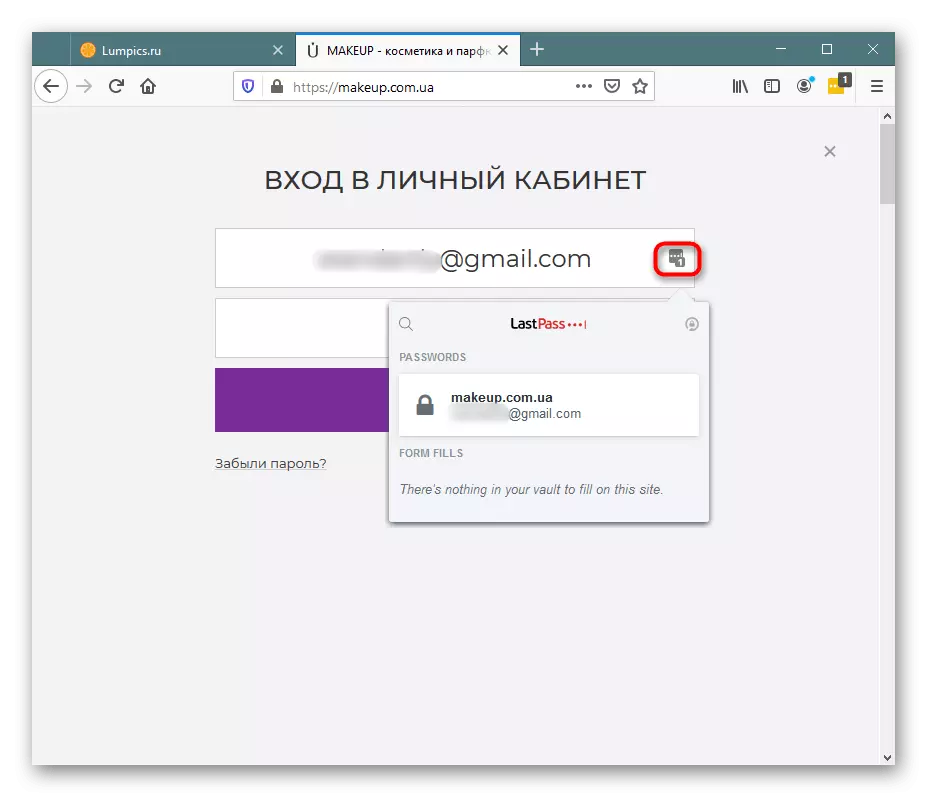
Method 1: manual password copying
If passwords are not so much, the easiest way to transfer them yourself, using the function of viewing and quickly copying the fields with the password and the password itself in Mozilla Firefox.
With the help of another our article, you can familiarize yourself with information about the location of all saved URLs, logins and passwords for them. It will only be able to copy the addresses of the desired sites and open them in another browser, and then go through the authorization form, copying and inserting login with password from Firefox.
Read more: How to view passwords in Mozilla Firefox
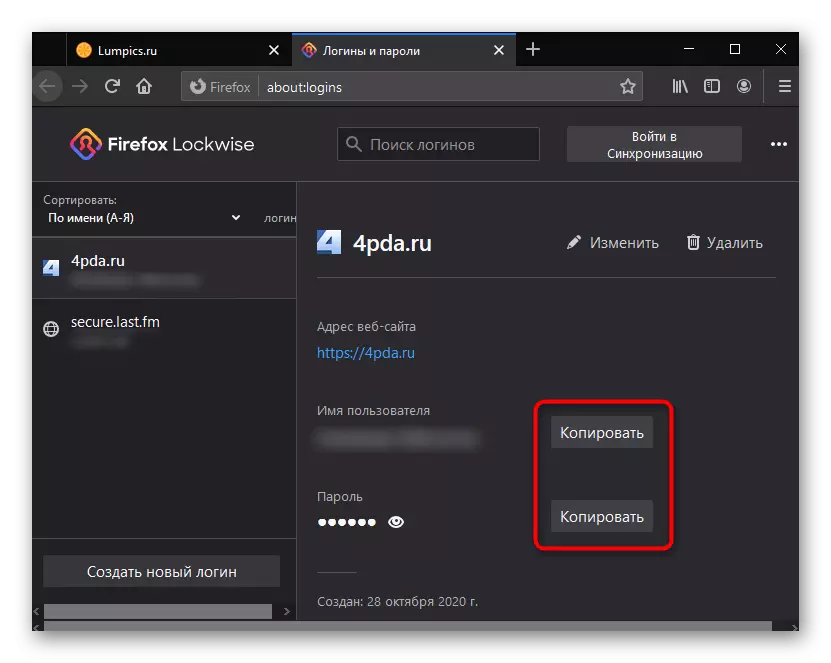
Method 2: Using third-party programs
With a large number of passwords with the need to transfer them to a separate file (usually the CSV format), you will need to resort to the use of third-party software, since the built-in browser tools will not work this operation. The network has not so many specialized software for exporting passwords from Firefox, so we can recommend only one proven solution - FF Password Exporter.
Download FF Password Exporter from the official website
- On the Find a block with download links, among which you choose the appropriate option. It is most convenient to use a portable version. It does not require installation in the operating system and is best combined for one-time use.
- Unzip the compressed folder and run the program. She immediately picks up the profile used. In most cases, it is not necessary to edit this setting, but if you changed the location of the personal profile (for example, transferred to the second disk) or in the browser, several profiles from which you should select other, click on the "Choose a Custom Profile Directory" link.
- If you have a password wizard, enter it into the appropriate field. If you did not come up with and did not turn on, then there is no password masters in your case, so just skip the step.
- When everything is ready, click "Export Passwords".
- The application will propose to choose the location of the file saving with passwords. By default, this is a folder with documents of your profile in the system.
- Open CSV with passwords can be ordinary "Notepad" built into Windows. In it you will see a list with URL, logins and passwords that match them. All of them are separated by the comma, and in the first line of the document also indicate which data and in which sequence are displayed.
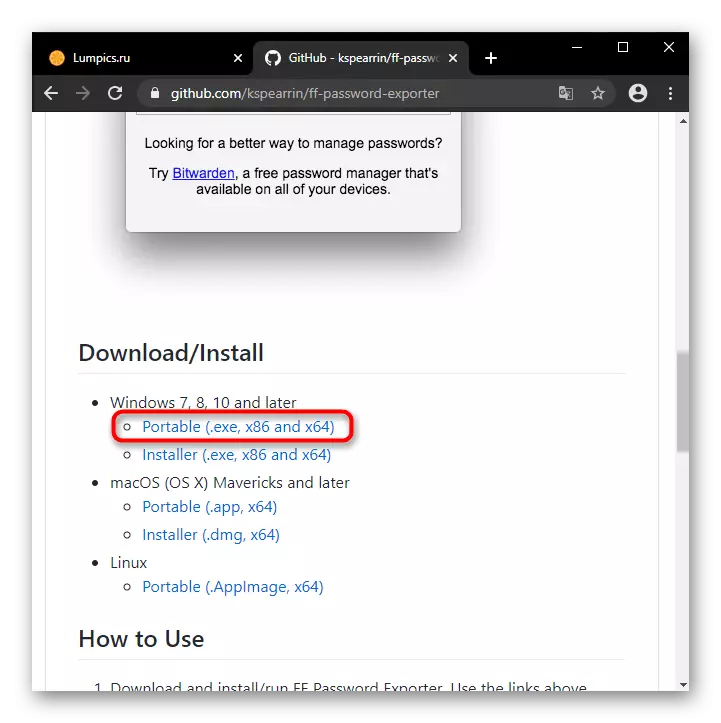
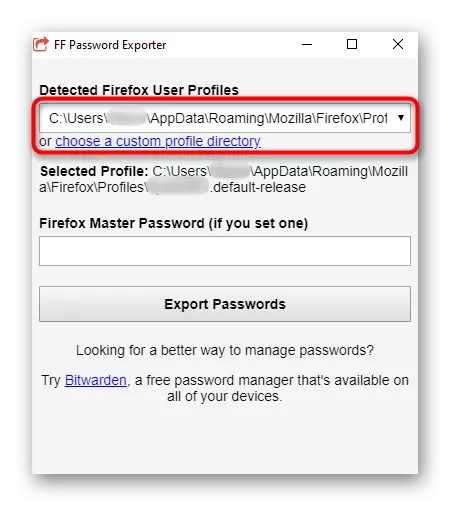
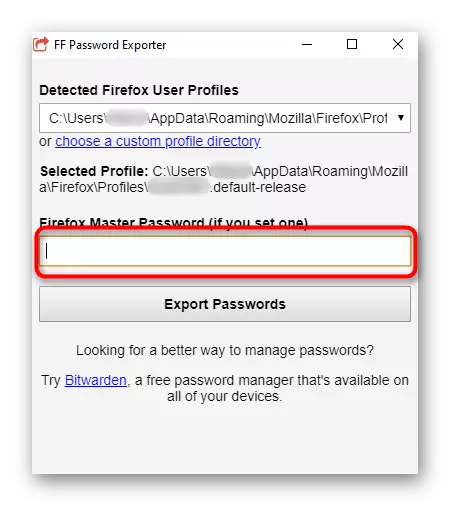
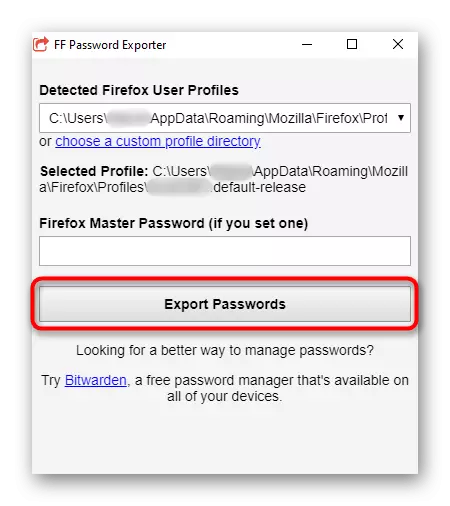


CSV can be saved as a backup file, for example in the cloud, and you can insert it into another browser to import that supports this feature (links to the instructions can be found in the method 5).
Store CSV in this form on the computer is not safe! Other users or viruses can kidnap it and access all accounts.
Method 3: Enabling Synchronization
If you need to transfer passwords from Firefox to Firefox, you can use branded synchronization. This will not only fulfill all the work on copying passwords (and other data at your discretion) to any other device where this browser is installed, but also secure from their loss, for example, when the computer breakdowns. On how to use synchronization, we have shown in a separate article on the link below. You need a way 3, telling exactly about this tool.
Read more: Using synchronization to save passwords in Mozilla Firefox

Method 4: Copy file with passwords
Those who need password transfer to another Firefox browser, but does not want to create a synchronization account, can perform password transfer operation locally. The essence of the method is to copy files responsible for storing passwords in a web browser, and transferring them to another PC. Unlike synchronization available for quick password exports to mobile Firefox, manual manipulations with files only work among desktop versions.
- Open the folder with the Firefox profile. Original Way - C: \ Users \ user_name \ APPDATA \ Roaming \ Mozilla \ Firefox \ Profiles, where user name is the name of your account in Windows. If you do not see the "APPDATA" folder, it means that the display of hidden and system files and folders is not enabled. This setting is activated by our instructions.
Read more: Displays hidden folders in Windows 10 / Windows 7
- The "Profiles" folder contains all profiles created within this browser. If you are using one, generated automatically after the first launch of Firefox, you will see only one folder of the "xxxxxxxxx.default-release" view, in other cases, repel from the name going after the point, or from the date of the folder change.
- Go to this folder with the profile and find the following among all files: "key4.db" and "logins.json". The first is responsible for passwords, the second - for the logins that correspond to them. Copy them both in the right place, whether it is a flash drive, cloud storage, a different place on a PC. In the future, insert these two files to the folder with the profile on another computer and replace them with the Firefox automatically created.
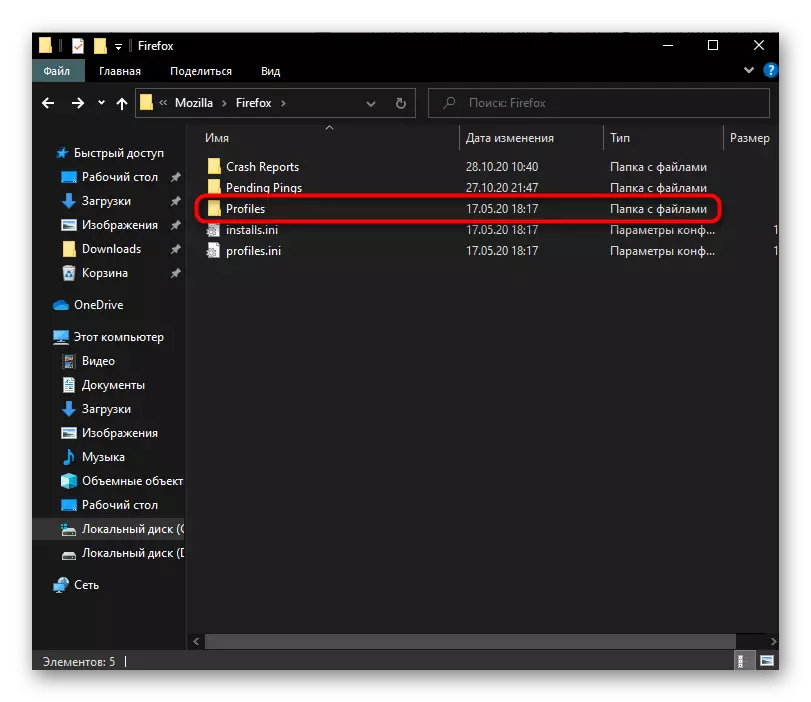
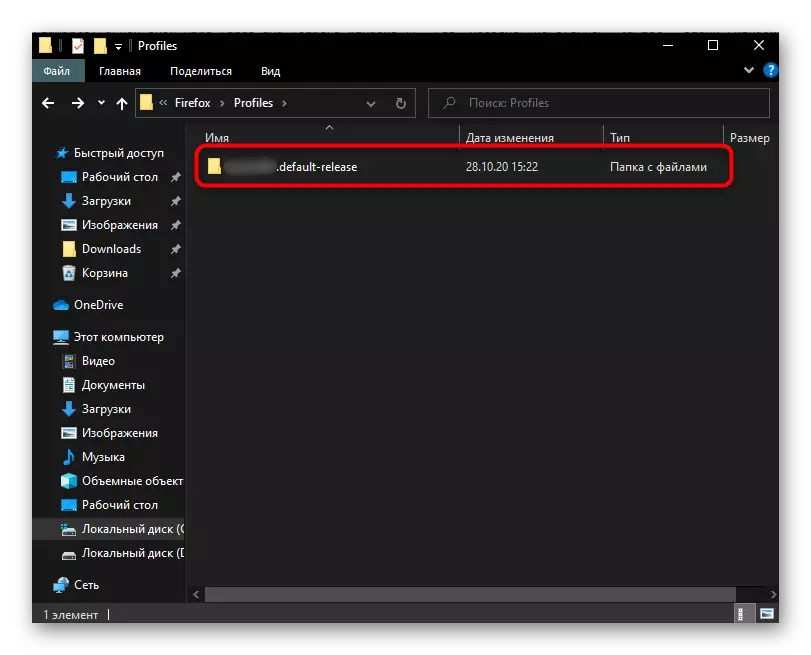
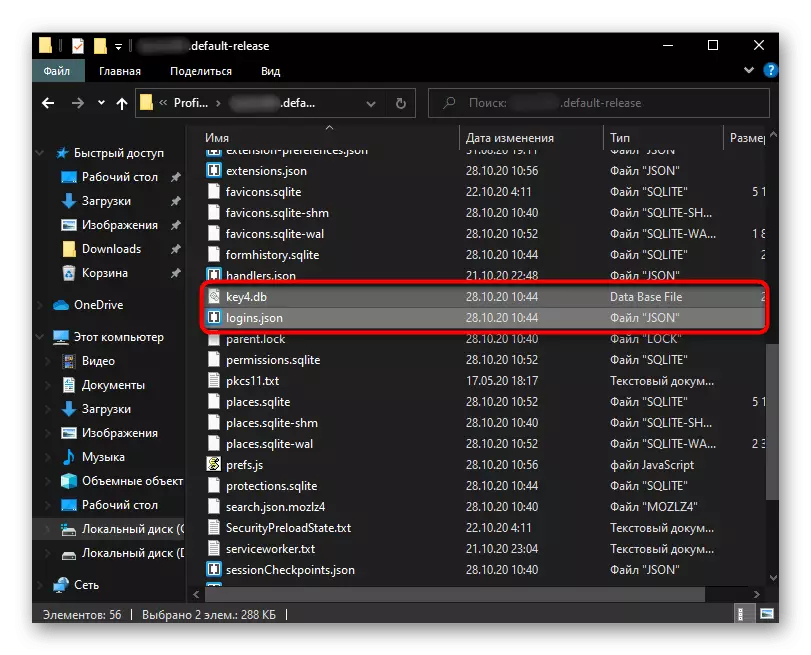
Unfortunately, this option is not suitable for transferring passwords to browsers such as Google Chrome, Opera, Yandex, since all of them have a different engine that allows you to replace similar files only between each other.
Method 5: Import in another browser
In some cases, the best option will be to use the import function in another browser. However, it is worth noting that not all web browsers support it by instantaneous transfer. Somewhere this requires a CSV file, the receipt of which we have considered in the method 2. In particular, this relates to Chrome and Opera, but in Yandex.Browser the possibility of transfer without the user's participation is already built into its settings.
See also: Import CSV file with passwords in Google Chrome / Opera
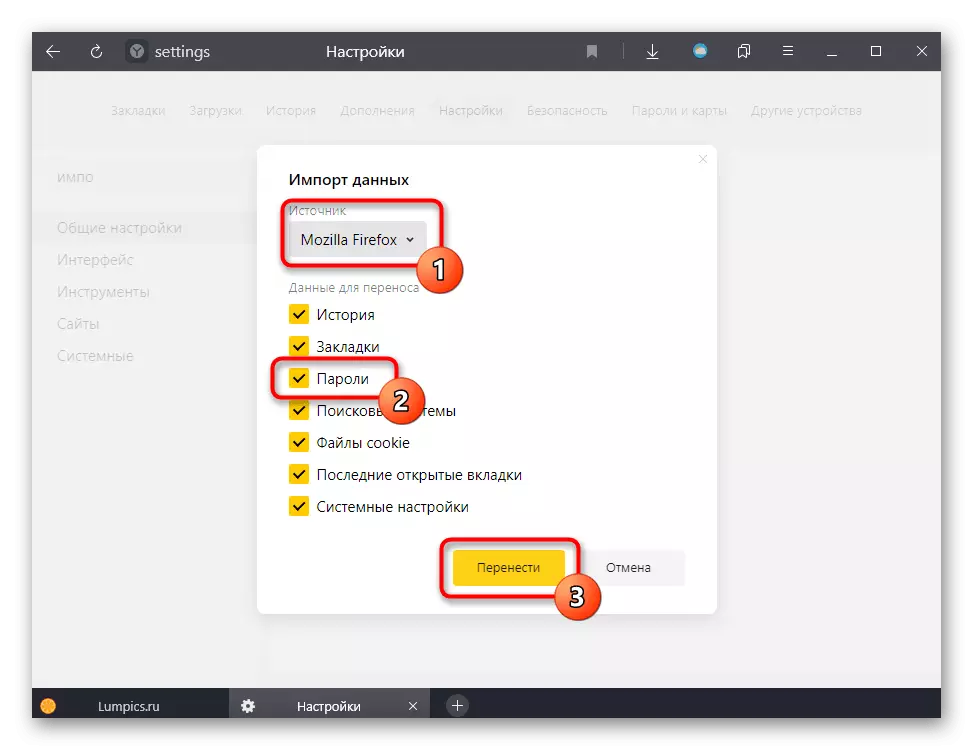
Method 6: Password Managers Extensions
As the last method, we mention the presence of add-ons acting as password managers. Exports with their help are inconvenient due to the fact that such supplements cannot be transferred to the passwords already saved in Firefox. The user will need to gradually fill this base with new passwords or leave profiles on authorized sites and go there again, confirming the saving password already inside the expansion. In short, it is more relevant for those who are just thinking about exports or is ready to spend time.
The advantage of such extensions is increased security: data is not stored in the browser, instead all passwords are substituted through the user account in the add-on itself. In addition, almost all popular password managers are available for modern browsers and different platforms. It will not limit you synchronization only on computers or browsers of a specific company: Save and quickly log in to your favorite sites in any web browser, regardless of its platform. In more detail about the principle of operation of these additions, we propose to read on the example of the most famous - LastPass.
Read more: Lastpass Password Manager for Mozilla Firefox
